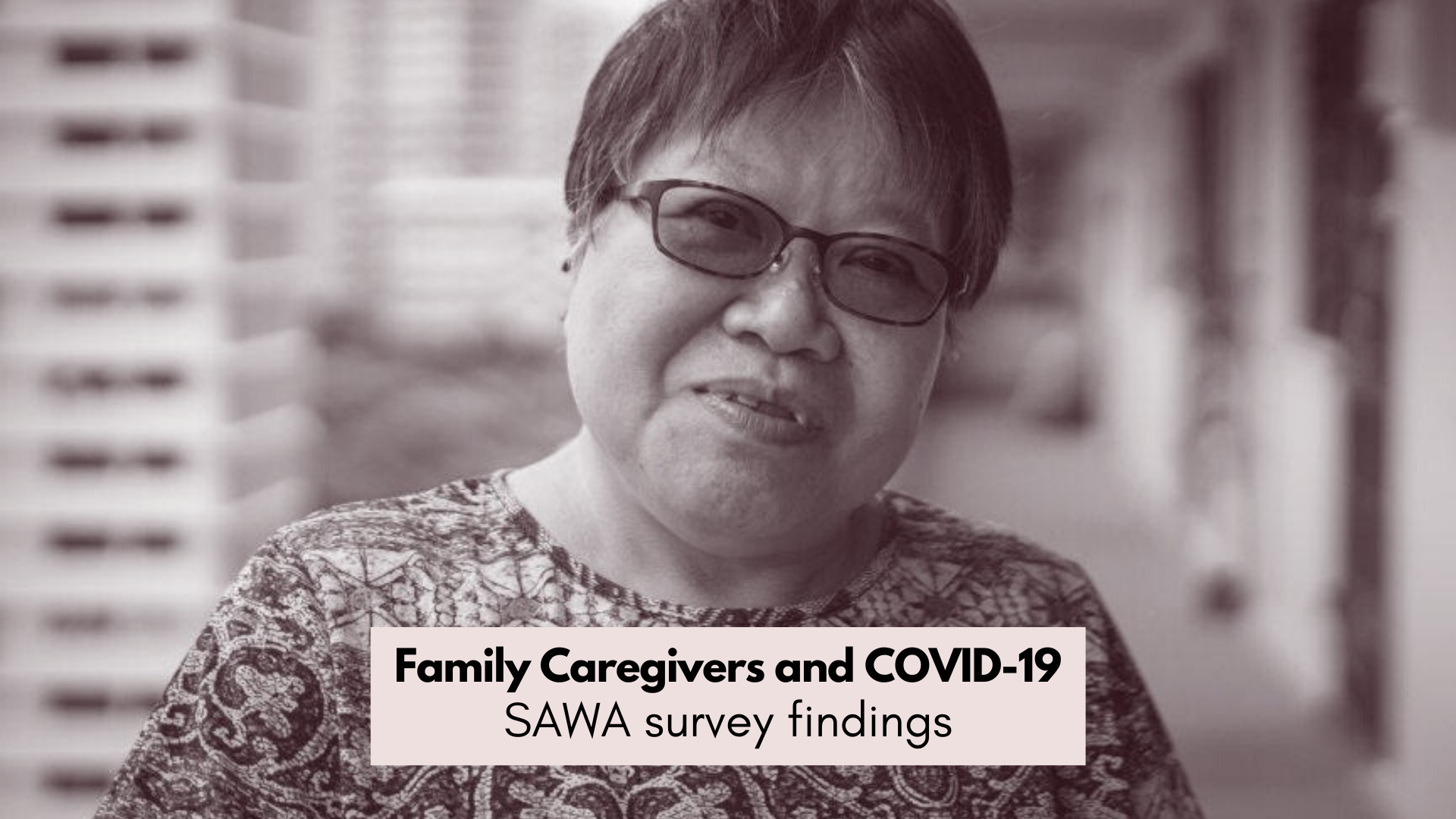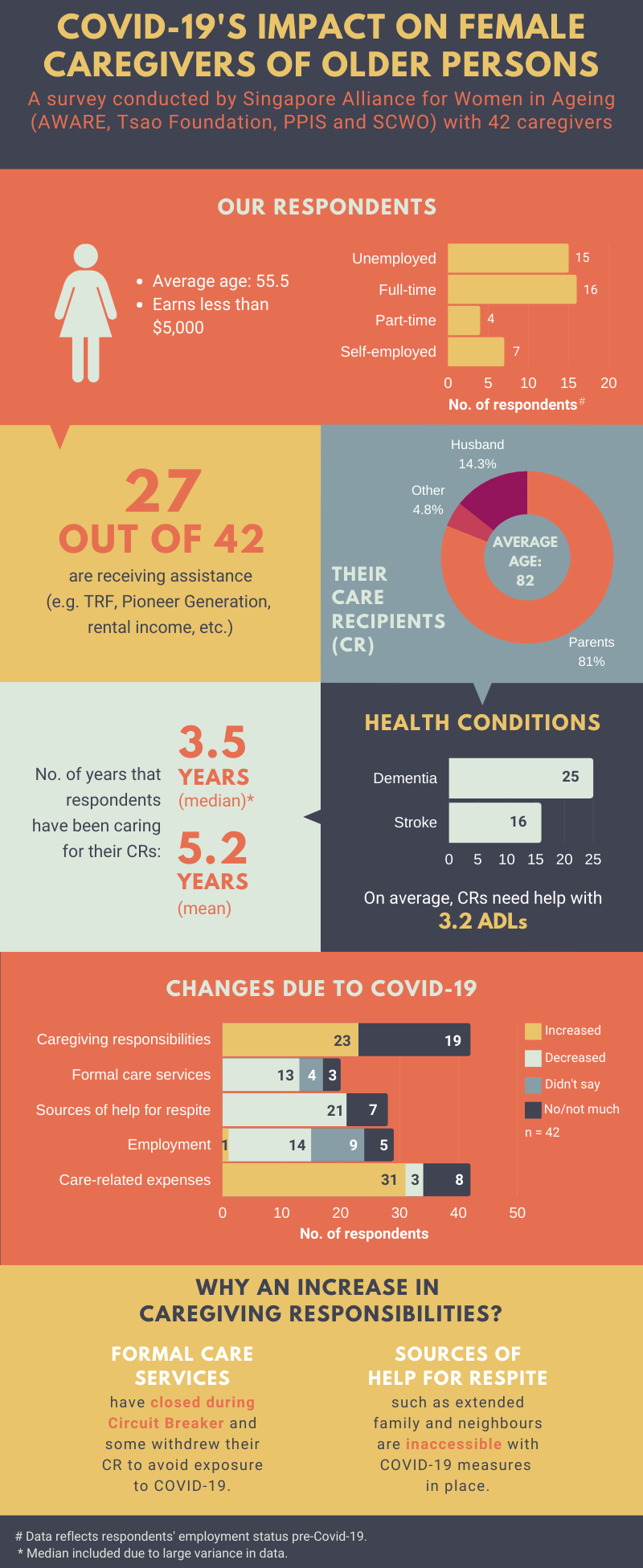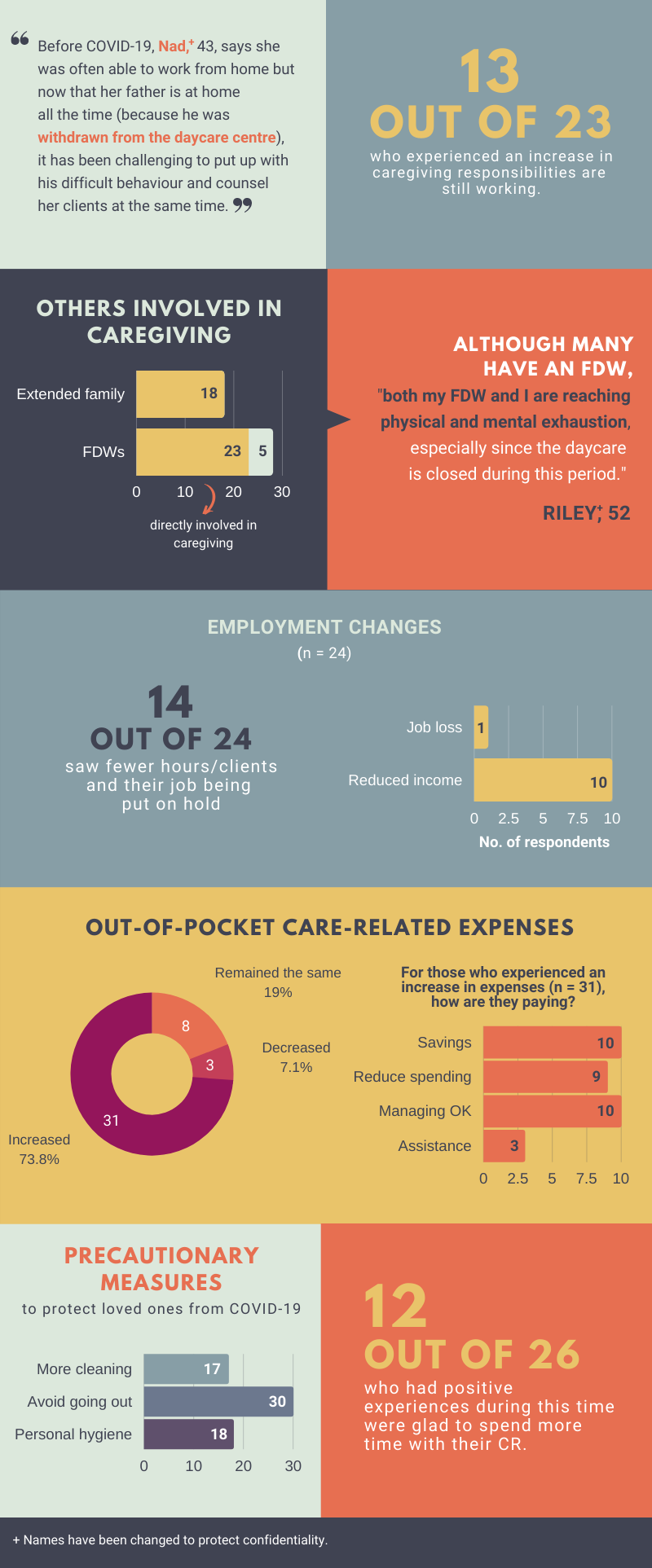-
Advocacy Theme
-
Tags
- Abortion
- Adoption
- Caregiving
- CEDAW
- Disability
- Domestic Violence
- Domestic Workers
- Harassment
- Healthcare
- Housing
- International/Regional Work
- Maintenance
- Media
- Migrant Spouses
- Migrant Workers
- Muslim Law
- National budget
- Parental Leave
- Parenthood
- Polygamy
- Population
- Race and religion
- Sexual Violence
- Sexuality Education
- Single Parents
- Social Support
- Sterilisation
- Women's Charter
Situation for female family caregivers has grown more dire during COVID-19, survey finds
June 8th, 2020 | News, Older People and Caregiving, Press Release

This post was originally published as a press release on 8 June 2020.
8 June 2020 – Family caregivers in Singapore shoulder a heavier care burden during COVID-19, while their incomes decrease and out-of-pocket expenditures rise.
These are the findings of a survey carried out in May by the Singapore Alliance for Women in Ageing (SAWA), which comprises four organisations: AWARE, Persatuan Pemudi Islam Singapura (PPIS), Singapore Council of Women’s Organisations (SCWO) and the Tsao Foundation. The alliance, which focuses on the gendered nature of eldercare, has called the survey results “highly troubling”.
“Ink was spilled before COVID-19 about the psychological and financial pressures of family caregiving, such as their propensity for burnout and—in the case of women—their difficulty achieving retirement adequacy,” noted AWARE President Margaret Thomas, on behalf of SAWA. “With the pandemic, it seems the situation has gone from bad to worse for many.”
SAWA interviewed a total of 42 female family caregivers for the elderly to study their experiences during COVID-19. The average age of the women surveyed was 55.5 years. All except two lived with their care recipients; four in five were caring for their parents and/or parents-in-law. At the time of the survey, 64% of respondents (27 of 42) were employed; all of these were making less than $5,000 a month from work. More than half (23) employed domestic workers.
As for the care recipients, their average age was 82 years, and they needed help with an average of 3.2 Activities of Daily Living (i.e. eating, bathing, getting dressed, toileting, transferring and continence). Almost half were suffering from dementia.
The SAWA survey found that with the COVID-19 outbreak, there was a marked increase in caregiving responsibilities for more than half of the respondents. With formal eldercare services closed, the onus was on caregivers to keep care recipients meaningfully engaged throughout the day, in addition to assisting them with physiotherapy and ensuring that their medical needs were met. One respondent was in the process of employing a new foreign domestic worker, but due to COVID-19, the worker was unable to start.
Caregivers’ informal respite options were also greatly diminished. While relatives used to be able to visit regularly to take over some care duties, the circuit breaker made that impossible.
Work was another major source of stress for caregivers, with work-from-home arrangements proving incompatible with caregiving. One respondent, a counsellor, reported trying to conduct counselling sessions from home, but with her father unable to go to daycare, having to deal with his difficult behaviour all day was extremely disruptive for her.
Of the 27 working respondents, 52% (14) experienced a change in employment, such as fewer clients, fewer working hours or having their projects put on hold. Many have seen a decrease in income. One respondent said, “Aside from tutoring, I used to do some training in schools, but with school closures, that’s no longer available for me, resulting in tight expenses now.”
On the other hand, 3 in 4 respondents saw an increase in out-of-pocket expenses during COVID-19. Their weekly expenditure rose: family members required meals throughout the day, utility bills were up and cleaning supplies needed to be regularly stocked. Multiple respondents were concerned about exposing care recipients to the virus on public transportation, so they had to opt for taxis instead. Only 1 in 10 were receiving any financial assistance, and only 1 in 3 felt that they were “managing OK for the time-being” with finances.
Despite the challenges, 3 in 5 respondents were able to see some positives in their COVID-19 situation. Of these, nearly half reported that in spite of the additional work, they appreciated having more time to spend with their care recipients. And around a quarter reported that the experience had given them new conflict management skills.
“During the pandemic, there has been a lot of discussion about the challenges of childcare—and rightly so,” said Ms Thomas. “But we haven’t spared as much thought to the other major group of caregivers in this country. And with the elderly at greatest risk of succumbing to COVID-19, what eldercarers do to protect their wards is more important than ever.
“We don’t think of family caregiving as ‘essential work’, because it is so invisible. That is why those who perform it remain sadly uncompensated. But the pandemic has thrown into relief all the ‘pain points’ of caregiving, highlighting what many of us have been advocating all along. Our caregivers deserve better, especially now.”
About SAWA
The Singapore Alliance for Women in Ageing is an alliance of organisations that promote the independence, care, participation, dignity and self-fulfillment of older women. SAWA was established in 2018 to bring public attention to the gendered nature of ageing. The four member organisations are:
AWARE
AWARE is Singapore’s leading women’s rights and gender-equality advocacy group. It was founded in 1985 and works to identify and eliminate gender-based barriers through research, advocacy, education, training and support services. AWARE embraces diversity, respects the individual and the choices she makes in life, and supports her when needed. aware.org.sg
PPIS
Founded in 1952, PPIS (Persatuan Pemudi Islam Singapura or Singapore Muslim Women’s Association) is a non-profit organisation focused on services for women, family and children. Our focus is on working with women of all ages in carrying out their multiple roles in society. PPIS runs three core community services, namely: Family Services, Student Care and Early Childhood Education (ECE). With 16 centres islandwide, the services work together to provide quality and holistic support as well as developmental programmes for women and their families across the different phases of their lives. ppis.sg
SCWO
The Singapore Council of Women’s Organisations (SCWO) was established in 1980 as the national coordinating body of women’s organisations in Singapore. SCWO has more than 50 member organisations, which represent over 500,000 women, and it serves to unite them to work toward the ideals of ‘Equal Space, Equal Voice and Equal Worth’ for women in Singapore. scwo.org.sg
TSAO FOUNDATION
Tsao Foundation’s vision is of an inclusive society for all ages that optimises opportunities in longevity. Established in Singapore in 1993, the goals of the non-profit family foundation are aligned to the MIPAA and WHO healthy ageing frameworks. Through four major initiatives—the Hua Mei Centre for Successful Ageing, Hua Mei Training Academy, International Longevity Centre Singapore and Community for Successful Ageing (ComSA)—the Tsao Foundation pioneers and provides community-based, person-centred primary healthcare for adults aged 40 and above; builds capacity in professional and informal age care and self-care; fosters elder empowerment and community development; and initiates policy-relevant research and cross-sector partnerships in its advocacy for mindset and systemic change to actualise health, wellness and participation over the life course. tsaofoundation.org





